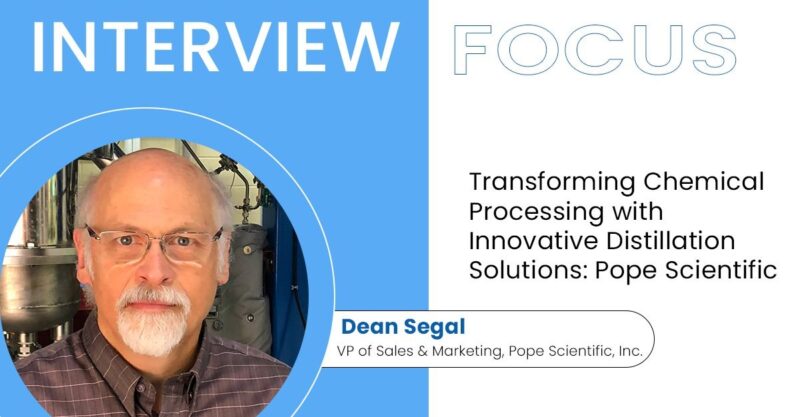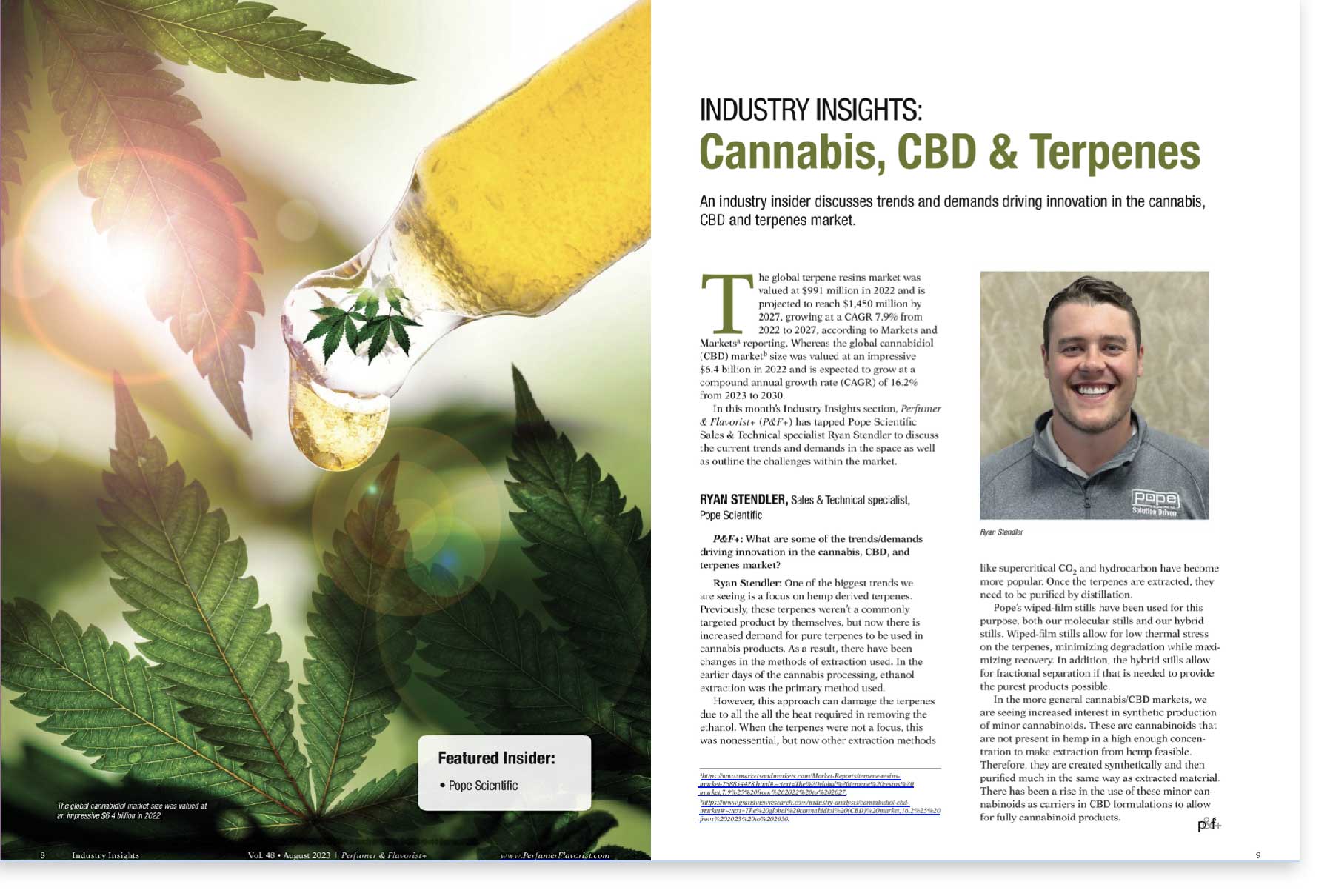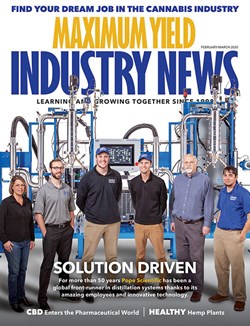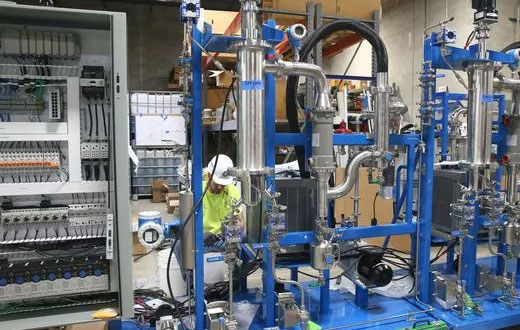Legal marijuana brings new sales to Pope Scientific of Saukville
SAUKVILLE – At first, the management at Pope Scientific Inc. kept quiet about their new business niche.
Orders for their sophisticated distillation apparatus — to the unschooled eye, tangles of tubes, flasks and valves — were flowing in, but Pope’s leaders weren’t saying much about where they were going.
They even used code when talking with workers in the company’s plant: The Rube Goldberg-like sets of equipment they were assembling were for “industrial customers.”
And a brief mention of Pope on certain blogs could set off alarms.
“We (were) kind of wringing our hands,” said Dean Segal, vice president for sales and marketing.
No more. The initial hand-wringing — over Pope’s participation in the surging marijuana market — has ended.
The firm, whose elaborate stills can be used to produce higher purity, higher potency cannabis products, exhibits at industry trade shows. It advertises in publications such as Marijuana Business Daily and Marijuana Venture. It established a special cannabis-oriented website separate from its mainstream business site. It even set up an Instagram account.
All for a new wing of business that is new only in the destination of the machinery being sold.
“It’s funny,” Segal said, pointing to the 55-year-old company’s decades of experience building distillation equipment for laboratories and for companies producing such things as pharmaceuticals, cosmetics, foods and fragrances. “For us it’s a lot of the same schtick. We’ve been there.”
Sort of.
No cosmetics industry customer ever showed up in Saukville wanting to pay for his $35,000 still with the cash he was toting in his backpack. (Pope politely told him he’d have to find an alternative medium of exchange.)
No one buying a high vacuum molecular distillation set-up for food processing ever made the purchase by handing over 80 individual $1,000 money orders.
Clients in other industries generally don’t address Segal as “man.”
Nor do they invariably operate under multiple names, sometimes leaving Pope, after a sale, to puzzle out who bought what.
And, Segal said, “there are times where people buy a still and then they disappear, and we have a hard time finding them.”
With all the quirks, though, it has been a very good market for Pope. Since entering the field three or four years ago, the company, which has 30 to 35 employees, probably has sold cannabis processors a couple hundred stills, Segal said.
“And growing,” he added.
‘Selling like hot cakes’
Segal, a 64-year-old biochemist and chemical engineer who has traveled the world in his 30 years with Pope, declined to disclose the firm’s revenue from marijuana-related sales. But he indicated that they have become an important part of the company’s overall business.
“I can tell you that that sector has increased our revenue significantly,” he said. “Let’s just say ‘very significantly.’”
Pope didn’t go looking for this business. Rather, marijuana entrepreneurs interested in extracting the plant’s active compounds and distilling them into a purer, more potent product came looking for Pope.
“We started getting a couple of calls,” Segal said. “And it just never stopped.”
The inquiries prompted internal debate about venturing into a controversial business. But with marijuana legal to some degree in a growing number of states, the firm’s leadership reasoned that it would be doing nothing unlawful — it has never allowed marijuana on its premises — or immoral.
It wasn’t as though they’d be selling Iran centrifuges to make atomic material, Segal said.
At first, the new customers — as a group, considerably more tattooed and pierced than Pope’s typical clientele — were buying relatively small glass distillation units. Current price: $40,000.
“That’s what we were selling like hot cakes — just lots and lots and lots of those,” Segal said.
But with legalization spreading, demand for larger and pricier equipment has increased.
Sitting at Pope for delivery to an eastern European customer who will distill a medicinal compound found in marijuana and its non-psychoactive cousin, hemp, is a two-stage, stainless steel still that costs a few hundred thousand dollars.
Not yet completed in another room is a unit that, for somewhere in the neighborhood of $500,000, is destined for a cannabis processor in California. It’s capable of distilling as much as seven liters of product — worth roughly $70,000 wholesale — per hour.
For the moment at least, this is definitely a growth industry.
Thirty states and the District of Columbia have legalized medical marijuana. Eight of those states, and the district, allow recreational use.
Legal recreational use in the huge California market began just last month. Canada is moving toward nationwide legalization this year.
A report by Arcview Market Research and BDS Analytics estimated U.S. sales of legal cannabis at $9.7 billion in 2017, up from $7.3 billion the year before. The firm projects sales of $24.5 billion by 2021.
That would roughly equal what Americans spent on spectator sports last year, and exceed what they spent on fresh milk.
Another research firm, New Frontier Data, comes up with lower numbers for cannabis — about $8 billion in 2017 sales — but a similar growth trajectory. It pegs the U.S. market at $18.4 billion in three years.
Not just for smoking anymore
Most people think of marijuana as something to be smoked, particularly the flowers of the plant, and smoking remains the most widespread method of consumption.
But in states such as Colorado, where marijuana has been legal for a few years, sales are tilting away from flowers, said John Kagia, executive vice president of industry analytics at New Frontier Data.
The trend, he said, is toward other cannabis-infused products. Chief among these are concentrates — potent substances heavily laden with the chemical compounds that produce marijuana’s psychoactive effects or, alternatively, are used for medical treatment.
That’s where Pope’s equipment comes in. Using the company’s wiped-film molecular stills, processors can take mud-colored, tar-like cannabis extract and produce a translucent yellow substance with the consistency of pine sap, fewer undesirable constituents and even higher potency.
“The long-term demand for concentrates is going to be very, very strong,” Kaiga said.
One reason: They can be used in vaping devices that, with their subtler odor, allow discreet consumption.
“Particularly for consumers who are relatively new to cannabis, that discretion is a really attractive aspect of vapes,” Kaiga said.
Like anyone with at least some involvement in the burgeoning industry, Pope’s business potentially could be affected by federal action.
Despite state-level legalization, marijuana remains illegal under federal law. The Obama administration chose not to interfere with the state laws, but Attorney General Jeff Sessions in early January rescinded that policy, unsettling the pot industry and clouding its future.
President Donald Trump, however, has said that marijuana legalization should be a state issue, and Sessions offered no specifics on how the policy change would be enforced.
Multiple polls, meanwhile, find that 60% or more of Americans support legalization. And industry watchers such as Kaiga and Matthew Karnes of GreenWave Advisors, for their part, voice doubts that the federal government will move aggressively against businesses that are legal in their states.
A federal crackdown is not likely, Karnes wrote in the wake of Sessions’ decision.
“I don’t really think it’s going to have any ramifications,” he said in an interview. “It’s just noise.”






